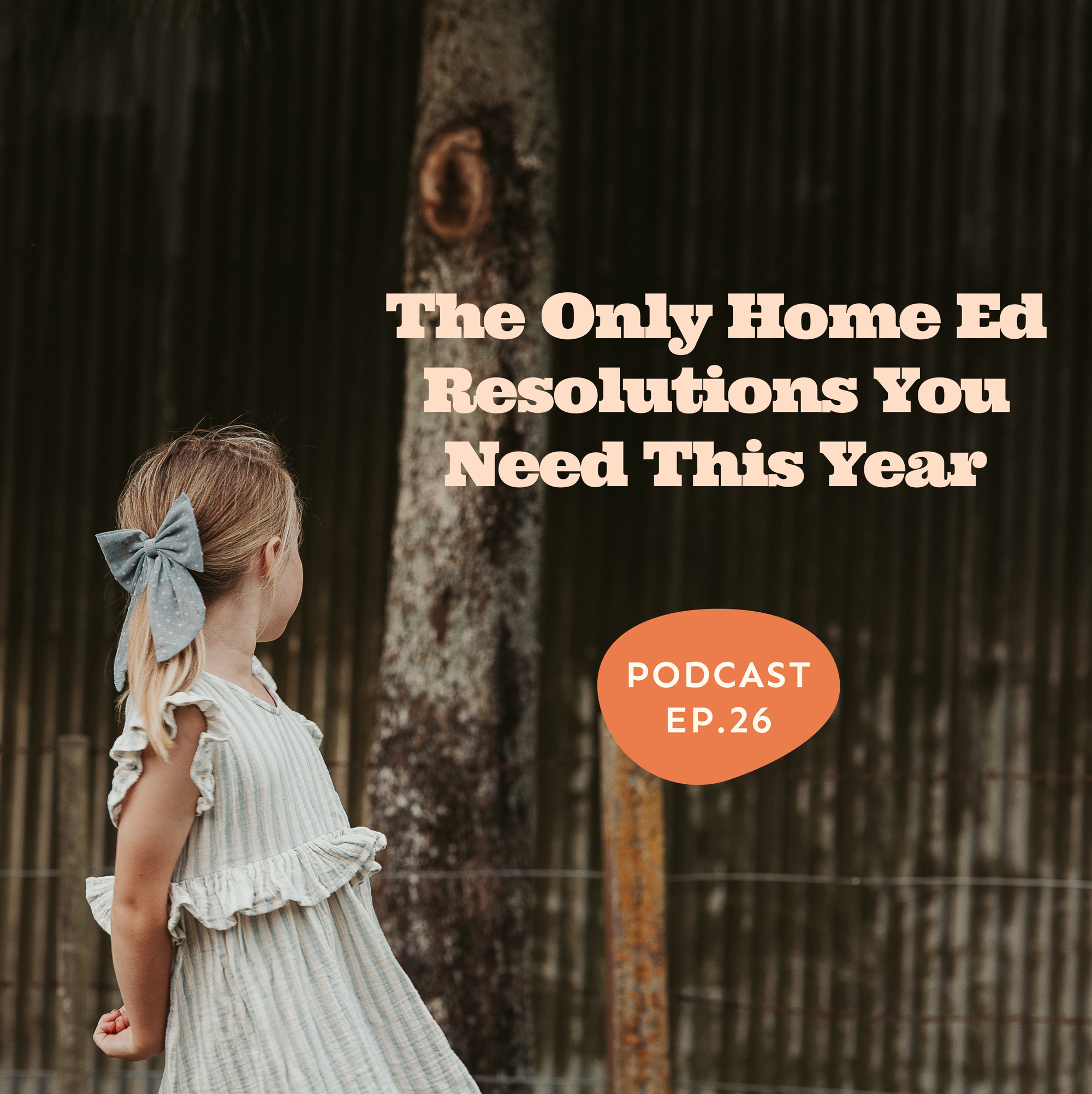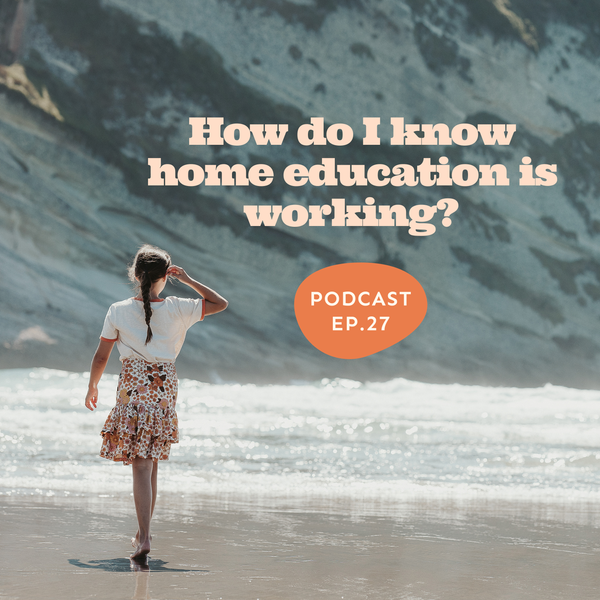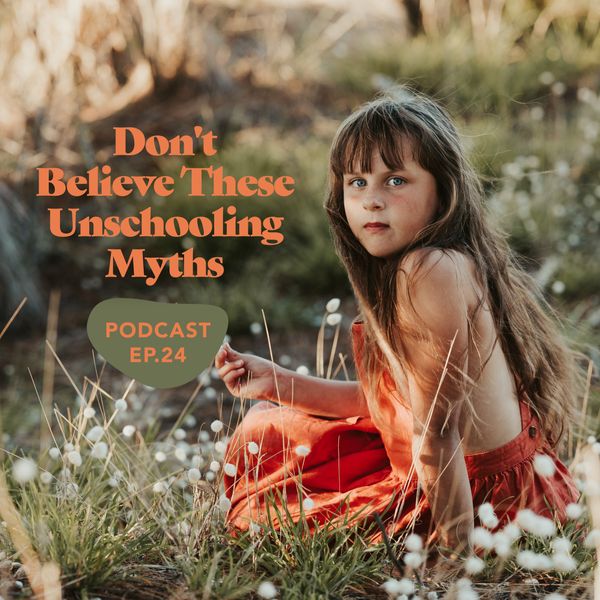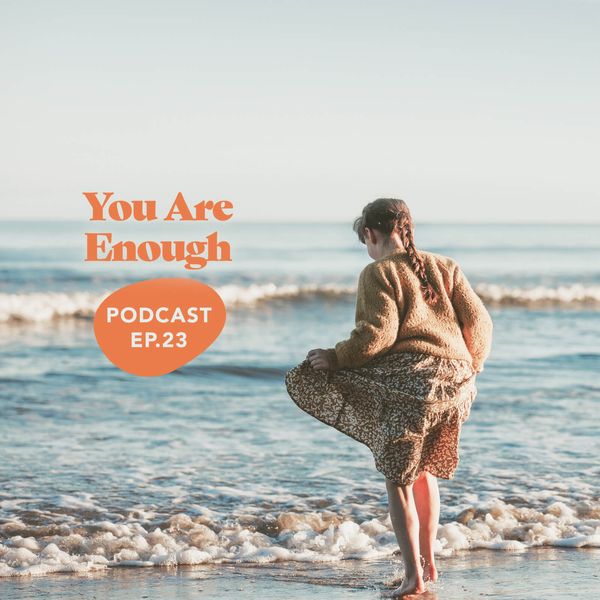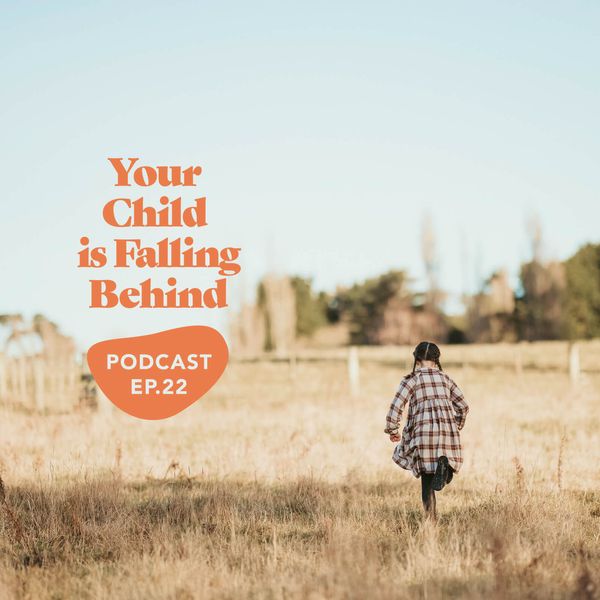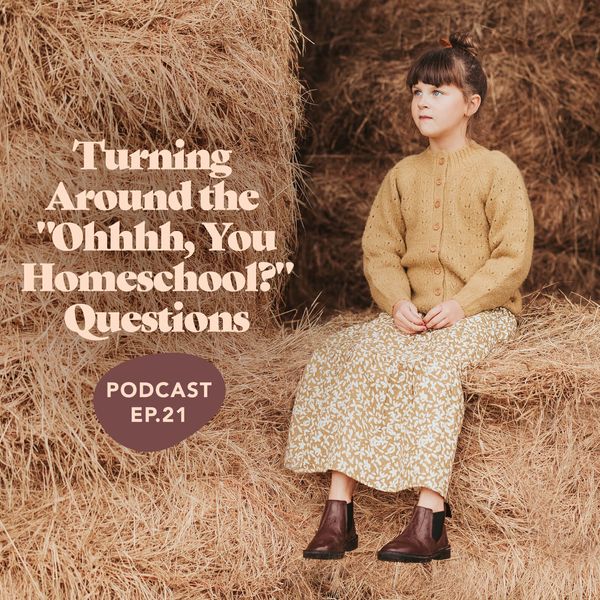In this episode, I'm digging deep into what could be the most important commitments we make as home educators this year. I explore:
- How to confidently reject any and all expectations that don't serve your family
- Building genuine confidence as your child's primary educator
- Breaking free from the pressure to make learning look "educational"
- Setting goals that actually matter to your family
- Protecting your own energy to create a sustainable journey
Whether you're feeling the weight of expectations at the start of this year, or you're ready to build a clearer, more intentional path forward - this one's for you. 🎯
These private episodes go even deeper, backed by research, the science of how children learn and grow, and more than a decade of lived home educating experience. Each one is designed to help you rethink, reframe, and recalibrate the way you're walking this path, giving you the confidence to live the version of life you want. The Collection is 23 episodes strong and counting, with over 10 hours of listening available right now.
As a subscriber, you'll also get immediate access to my self-paced course, expert-led masterclasses recordings, five downloadable guides, our school exemption documents, and more 💛
Show notes
Browse my full library of mini-episodes (with new ones landing every week), right here 🎙️
Complete transcript
INTRO
Helloooo and welcome to the Life Without School podcast, here to help you and your children live the life you want to, not just the one you’re told you should.
I’m Issy, a writer and home educating dad from New Zealand.
You can find my work at starkravingdadblog.com - all of my posts, podcast episodes and more, all designed to encourage, support and reassure anyone walking this road less travelled.
Thank you so much for tuning in to listen today. Alright, let’s get into this episode.
/INTRO
Hello!
Good morning, or afternoon, or evening - whenever it happens to be for you right now. Just quickly, before we get into this episode, I want to make sure you know about the mini-episodes I now release every week.
These are short, focused conversations - usually around 8-10 minutes - designed to give you regular support and encouragement on your home education journey. As of today, there’s over two hours of extra podcast listening there. I’ve posted mini episodes on all sorts of things so far - why I don’t tell people I’m an unschooler or homeschooler and what I say instead, how to get the joy back into this lifestyle when you’re feeling burnt out, my thoughts on whether or not you really need a homeschooling community, what to do if your child hasn’t found their spark yet - all sorts of episodes that are super focused in on one thing. And I’ve tried to make sure they’re a really good mix of supportive and reassuring, but also genuinely, actionably helpful in your day to day. There’s 12 there so far, and there’s a new one every week.
You won't find these in your normal podcast feed - they're only available on my website as part of my Life Without School Collection. Just jump over to www.starkravingdadblog.com and look for them in the menu, or browse the posts on my website for titles with the microphone emoji. I'll also link to them directly in the show notes for this episode.
Ok, it’s mid-January, as I sit down to record this, and I really like this time of year. It creates a natural pause. I’ve actually never been a fan of new year’s resolutions much, because I believe we should be working hard on what matters to us all the time. That we should be reflective often. That, if we’re not thriving for whatever reason, or feeling good about the goals we’re working towards, then we should adjust. Not at some arbitrary date on the calendar, but right now. I also know that statistically, most people’s new years resolutions fail. They don’t manage to keep at them. And when I say most, I mean over 90%. The last figure I read on this, from a year or two ago, was that only 9% of people actually follow through on what they promise themselves in January.
But - with that said - there is a freshness that comes with these January days. Like I say - a natural pause where we can step back, reflect, and really think about where we are and where we're heading.
And as home educators, I think we need these times of reflection more than most. Because our choices and our goals and our hopes and our plans aren’t just about education. They're about fundamentally reimagining what childhood will look like for our kids. What learning will look like. What our family’s flows and rhythms will look like. And without these periods of really intentional thought and planning, it's easy to just keep rolling forward, day after day, until we find ourselves somewhere. Maybe where we wanted to be, but maybe not even close.
Right now, you’ve probably come through a holiday season filled with - usually - well-meaning family members asking pointed questions about your children's education, and life. You’re probably seeing other parents posting about their big plans for the year ahead. You've probably scrolled through Instagram or Facebook or Tiktok, and seen some beautifully curated homeschooling spaces and felt that familiar knot in your stomach about whether you’re prepared enough, or doing enough.
And so, like many of us do at this time of year, you might be thinking about what needs to change. What needs to improve. What goals you should be setting to make sure this year is categorically better than the last.
Over the years, Kate and I have learned a lot about ourselves, and a lot about our children. We’ve made a bunch of mistakes, we’ve stumbled, we’ve struggled, but through all of that we have learned what - to us, at least - makes for a successful, thriving, motivated home educating environment. And it's not about having the best resources, or the most structured plans, or even the clearest educational philosophy. It's about something deeper. It's about finding ways to trust in yourself. To trust in your children. To filter out the noise. To understand how to measure progress in ways that actually matter to you.
So today, I want to talk about five commitments that I think we could all make for the year ahead. Five ways we could choose to show up differently for ourselves and our children. Not your typical new year's resolutions about curriculum choices or daily schedules or academic goals.
But something that I think matters so much more. Ok, let’s get started.
<MUSIC>
Resolution number one: "I will reject every 'should' that isn't ours."
Think about how many times a day you hear or think the word "should." Children should be reading by age six. They should be doing at least some structured math every day. They should be in regular social activities. They should have a routine. They should be working at grade level in this subject, or that subject. They should, they should, they should...
These "shoulds" are everywhere. They come from family members, from other home educators, from social media, from strangers we meet at the park, from the news, from all around us in society. But the most persistent ones are from the voice in our own heads. The one that's internalised every expectation we've ever been given about what education should look like.
And the thing about them is that they accumulate so quietly we barely notice them piling up. Each one seems small on its own. Reasonable, even, maybe. But together? They create this invisible weight that we carry around every day without really being conscious of it. They make us question our choices, doubt our instincts, and constantly look over our shoulders to see if we're measuring up to some standard we never actually chose for ourselves.
And when we really examine these "shoulds," when we hold each one up to the light and ask "Is this actually true for us? Is this actually what my child needs?" - most of them start to crumble.
Because the truth is, there is no universal "should" in education. There's no single path that every child must follow. What works beautifully for one family might be completely wrong for another. What energises one child might drain someone else.
Just to be clear, making this resolution, this commitment - to reject every "should" that isn't truly ours - doesn't mean throwing everything out. It just means being very intentional about what we keep. It means examining each expectation, each pressure, each assumed requirement, and asking ourselves: "Does this serve us? Does this align with who we are, what we value, and what we’re trying to get out of life?
I’ve covered a lot of the actual specific ‘shoulds’ in other episodes, so there’s lots to go and explore there if you want to spend some time in that headspace - but let’s skim over some of the common ones right now. Just to help center us, and ground us.
"Children should be doing formal academics by age six." Should they? Or is that just when the school system starts, so that's when formal instruction has to begin as well? This age wasn't chosen because of some crucial developmental milestone. It wasn't based on research about when children's brains are primed for formal learning. It was chosen because that's when it was convenient to start mass education during the industrial revolution. Because that's when children could sit still long enough to be managed in large groups.
What if your six-year-old is deeply engaged in understanding the world through play, through movement, through endless questions and exploration? What if they're building crucial neural pathways through hands-on experiences that no worksheet could ever provide? What if pushing formal academics now would actually interrupt natural learning processes that are already happening - processes that are laying the real foundations for deep understanding later?
The research is clear on this: children who start formal academics later do not fall behind. In fact, many of them roll ahead, because they've had the time to develop the cognitive, emotional, and physical foundations that make learning meaningful. They've built the curiosity, the problem-solving abilities, and the confidence that drive genuine, real learning.
Ok, but what about this - "You should be following a curriculum." Should you? Or is that just what feels safe because it's what we're used to - because it gives us a sense of control, a feeling that we're covering all the bases? Think about what a curriculum actually is: it's someone else's idea of what should be learned, in what order, and at what pace. It's a standardised path designed for a standardised child who does not actually exist.
What if your child learns best through diving deep into their interests, following threads of curiosity that weave subjects together in ways no curriculum designer could ever have planned? What if their understanding of physics comes through skateboarding? What if the structure of a curriculum is actually getting in the way of a child’s real understanding - cutting off natural learning pathways just as they're beginning to form, all because it's time to move on to the next section?
A curriculum can be a useful tool, absolutely. But the moment it becomes a strict map that we have to follow, the moment we prioritise checking boxes over real engagement and understanding - that's the moment we risk turning learning into a chore. Do you need a curriculum? Maybe? But maybe not.
Ok, next - "Your child should be reading independently by now." Should they? Says who? Based on what understanding of how reading actually develops? Because the science of reading tells us something very clear: reading readiness is never about age at all. It's about brain development, and that happens on highly individual timelines. Some children's brains are ready to crack the reading code at five, others at seven, others at nine or later. And forcing it before that readiness is there doesn't speed up the process - it just creates anxiety and resistance.
What if they're building incredible comprehension through being read to? What if they're developing a deep love of stories, an understanding of complex language patterns, an ability to follow detailed plots - all while their brain quietly works away at the fundamental processes that will eventually make reading click? What if their brain is actually doing exactly what it needs to be doing right now - developing spatial awareness, or working memory, or audio processing - all crucial foundational skills for reading that develop before the actual mechanics of decoding text?
The path to reading is not linear. It's not about ticking off skills in a specific order by specific ages. It's about building a complete framework of understanding around language and meaning. And sometimes, the children who come to reading later - when their brains are truly ready - become the most voracious readers of all. Because they found their way there through trust and readiness, not through pressure and timelines.
Ok, and now a final one - "Your child should be in regular social activities." Should they? Or is that just our culture's narrow view of socialisation - this idea that healthy social development means being in structured groups with same-aged peers multiple times a week? Think about how artificial that is. Nowhere else in life do we spend most of our time in age-segregated groups, moving from one structured activity to another. That's not what real social connection looks like.
What if your child gets their social needs met in different ways? Through deep conversations with family members, through meaningful interactions in their community, through genuine friendships that develop naturally around shared interests? What if they need more time for those one-on-one connections that actually fill their cup, rather than scheduled activities in larger groups that drain it? What if constant social activities are actually getting in the way of your child developing genuine social confidence - the kind that comes from knowing yourself and connecting authentically with others, not from being pushed into constant social situations?
True socialisation isn't about how many activities we do or how many groups we're part of. It's about learning to connect meaningfully with others, to navigate relationships, to understand yourself in relation to the world around you. And sometimes, that happens most powerfully in the quiet moments, in the small interactions, in the natural rhythms of real life.
Now, the main point I want to make here isn't that all these "shoulds" are just plain wrong. The point is that none of them are automatically right. They each need to be examined in the context of your unique family, your unique child, your unique circumstances.
Sometimes, the answer will be yes - some of these expectations will align perfectly with where your child is at, and what you want for your family. And that's fine. But you'll be choosing them consciously, intentionally, because they work for you - not because someone else said you should.
So this year, make a commitment to question every "should" that comes your way. To hold each one up to the light and ask: "Does this serve us? Does this help us thrive? Does this align with who we are and what we believe about learning?"
Because when we clear away the "shoulds" that don't belong to us, we make space for something more important: The ability to see and support our children as they actually are, not as someone else thinks they should be.
<MUSIC>
Resolution number two: "I will actively build my confidence as my child's primary educator."
I believe every home educating parent needs to hear this, and to work on it, myself included.
Notice that word "actively." Because here's what I've learned over the years: Confidence isn't something that just happens to us. It's not something we can wait for. It's something we have to consciously build, step by step, choice by choice, day by day.
When you stop and really think about it, the weight of that choice - to be your child's primary educator - is enormous. You're not just making a different educational decision. You're stepping away from a system that's been in place for generations. You're telling your family, your friends, your community that you are going to walk a different path. One that might not make sense to them. One they might worry about, or question, or even openly criticise. And in those moments of doubt that creep in - usually at 2am when you're lying awake wondering if you're doing enough, or doing it right - that weight can feel almost overwhelming.
The world will tell you that you need specific qualifications to educate a child. That you need expert knowledge in every subject. That you need to know exactly where you're going and how you'll get there. That you need proof you can do this. But what I want you to understand is this: those doubts you feel? They're not a sign that you're doing something wrong, or that you're not cut out for this. They're just a positive sign that you understand the magnitude of what you're doing. They're a sign that you care deeply about giving your children what they need.
So how do we actively build our confidence? It starts with making different choices in those moments of doubt. When that voice asks "are you really qualified to teach them?" - instead of spiralling into uncertainty, we can actively choose to look at what's actually happening. We can watch our children learning naturally, following their curiosity, developing understanding in their own unique ways. We can consciously recognise that we're not trying to be a teacher in the traditional sense - we're being something far more valuable: a guide who deeply knows and understands our child.
Every time you make this choice - to trust what you see over what others say you should be doing - you're actively building confidence. Every time you notice your child completely absorbed in building something complex with lego, working out spatial relationships and engineering concepts that no curriculum could teach as effectively - and you protect that time, even though your plan for the day looked different - you're actively building confidence. Every time you sit with your child's deep question about how the world works, exploring it together instead of rushing to give them the "right" answer, you're actively building confidence. Every time you notice your child struggling with the idea of reading at a desk but enjoying it when they read recipes or board game instructions - and you adapt everything to honour that they learn better that way - you're actively building confidence.
That deep understanding of your child? That willingness to adapt and find what works? That's worth more than any teaching degree or curriculum guide could ever be. And every time you consciously choose to trust that truth, you strengthen your foundation.
Think about the most confident home educators you know - the ones who've been doing this for years and years, and just seem so sorted. They didn't get there by accident. They got there by consistently choosing to trust their observations over their doubts. By intentionally focusing on what was working rather than what others said should be happening. By actively collecting evidence that their path was working - not for others, but for themselves.
When their child finally grasped a concept they'd been struggling with, they didn't just celebrate the moment - they consciously noted how that understanding came about naturally, in its own time. When they saw their child dive deep into learning something simply because it interested them, they actively recognized it as proof that children are wired to learn. When they witnessed their child figure something out in their own unique way, they didn't worry that it didn't look like traditional learning - they deliberately added it to their mental bank of evidence that this path works.
These moments might look small to others. They might not fit neatly into any conventional measure of progress. But you know what they mean. You know their importance. And each time you consciously choose to see them as evidence, to trust them over external pressures and expectations, you're actively building that foundation of confidence.
Remember: you've already shown more courage than most people ever will, simply by choosing this path. Now it's time to build your confidence with the same clear intentionality. Not by trying to eliminate doubt, but by actively choosing, every single day, to trust your observations, your understanding, and your deep knowledge of your child over anyone else's expectations or standards. Because it’s that conscious choice that will one day build an unshakeable confidence.
<MUSIC>
Resolution number three: "I will stop feeling the pressure to make learning look educational."
This can be a hard one to actually live out. You know that pressure, right? The one that makes you panic a little when someone drops by unexpectedly and your children are just...playing. The one that has you mentally cataloging all the "educational" - inverted comma - things that happened today when someone asks what your children have been learning. The one that makes you feel like you need to translate everything into terms that sound more academic.
It's the pressure that pushes us into what I call "educational theatre" - the feeling that we need to perform learning for others in terms they’ll understand.
"Oh, they're actually learning geometry!" when our child is building with blocks.
"This is practical biology!" when they're helping in the garden.
"We're doing hands-on physics!" when they're just...playing on the swings.
As if play, and creativity, and helping around the home aren't valuable enough on their own. As if learning only counts when we can label it with something that would be happening in a classroom.
This educational theatre - this feeling that we need to perform education for others - it's exhausting. Not just for us as parents, but for our children too. Because somewhere beneath all that translation and justification, there's a subtle message that their natural way of learning, of exploring, of being in the world...isn't quite enough.
What we have to understand is that a lot becomes possible when we let go of this pressure. Including a huge amount of the confidence building we’ve just been talking about. When we can fully see and celebrate the incredible learning that's already happening, without trying to dress it up as something else.
Picture your child lost in elaborate pretend play - creating complex characters, weaving intricate storylines, solving problems within their own imaginary world. That's not just play. That's your child building sophisticated neural pathways, developing emotional intelligence, practicing problem-solving skills, strengthening their memory and attention. Not because someone made it "educational," but because this is how children are wired to learn.
Or watch them in the kitchen, helping to double a recipe. They're not just cooking - they're exploring mathematical concepts in a way that no worksheet could ever match. They're building an intuitive understanding of fractions, measurements, and proportions. They're seeing chemistry in action as ingredients combine and transform. They're developing executive function skills as they plan and sequence steps. And all of this learning is happening naturally, joyfully, because it matters to them.
This is what real learning looks like. It's messy. It's nonlinear. It very rarely fits into neat academic categories. But it's incredibly powerful precisely because it's happening in context, driven by genuine interest and real-world application. And the more you try and categorise it into academic subjects, the less naturally it will unfold.
Think about the most powerful learning experiences from your own life. The ones that really shaped you, that taught you something meaningful about yourself or the world. Did they happen when someone was trying to make whatever it was educational? Or did they happen naturally, through living, through following your interests, through tackling real challenges that mattered to you?
When we step off the stage of educational theatre - when we stop trying to perform learning for others - something remarkable happens. The curtain falls away, and suddenly we can see the extraordinary learning that's already woven through our ordinary days with clarity. We notice our children developing complex understanding through their play, their questions, their experiments, their mistakes, their discoveries. Not because we're looking for it, not because we need to prove it's happening, but because it's simply what children naturally do when we get out of their way.
This shift - from performing education to truly trusting learning - is a natural extension of the confidence we talked about earlier. It's another layer of rejecting those external "shoulds" that don't serve us. Because maybe the biggest "should" of all is this idea that learning needs to look a certain way to count.
A child studying ants in the garden isn't just exploring - they're developing scientific observation skills, learning about patterns and systems, building patience and focus.
A child negotiating rules for a game with friends isn't just playing - they're developing critical thinking skills, practicing diplomatic communication, learning to see different perspectives.
A teenager moderating an online community for their favourite game isn't just having fun - they're developing leadership skills, learning about group dynamics, practicing conflict resolution in real situations that matter.
The learning is happening. It's deep, it's real, and it's meaningful. Sometimes it looks like focused study. Sometimes it looks like daydreaming. Sometimes - actually, oftentimes - it looks like "just playing." But when we trust in this process - when we stop trying to validate it through a traditional academic lens - we free ourselves and our children to embrace learning in all its natural, beautiful forms. And, ironically, we start to see the real life application of that learning more clearly.
This doesn't mean we should never guide or support our children's learning. It doesn't mean we never offer resources or create opportunities. But it means doing these things because they serve our children's natural development and interests, not because we need to prove something to the world. Or label it for someone else’s validation.
So this year, let's make this commitment: To trust in the learning that's already happening. To see the value in all the moments - big and small - where our children are engaging with the world around them. To find the confidence to say to a visitor - "Yes, they're just playing right now" - knowing in our hearts that play is exactly what they need to be doing.
Because when we step off that stage we create space for genuine, joyful, meaningful learning. The kind that doesn't need translation or justification. The kind that lights our children up from the inside and carries them forward on their own momentum. The kind that lets them become exactly who they're meant to be, learning deeply in ways that matter to them.
And in that space? That's where the real magic happens. Not just for our children, but for us too. Because when we no longer feel like we have to direct a performance, we get to be fully present for the actual journey.
<MUSIC>
Resolution number 4: "I will set meaningful goals that matter to us."
Ok, right now you might be thinking - wait, didn't we just talk about letting go of external pressures? About stepping away from performing education? About trusting natural learning? So why are we now talking about setting goals?
Because setting goals is never the problem. The problem is whose goals we're setting, and why. There's a world of difference between goals and measures that are pushed on us from the outside, and goals that grow from within. Between measuring progress against someone else's standards, and tracking growth in ways that actually matter to our unique children, our unique family.
Most of us grew up with one very specific picture of what goals should look like: Grade-level standards. Test scores. Academic benchmarks. Reading levels. Progression in mathematics. And when we first step into home education, like we’ve talked about, we often carry those expectations with us. We feel like we need clear, measurable, academic targets - because that's what goals are supposed to look like for children...right?
I know how scary it can feel to let go of those traditional academic goals. Especially when we're surrounded by people measuring progress in conventional ways. When family members ask about grade levels, when friends talk about test scores, when it feels like everyone else is measuring success with numbers and charts - the same numbers and charts...choosing a different path takes real courage.
But when we let go of those predetermined targets and start paying attention to who our children actually are, we very quickly start finding different kinds of goals. Goals that spark real enthusiasm. and motivation Goals that create genuine growth. Goals that actually mean something to our children.
A child who's deeply interested in basketball might spend hours working on their jump shot in the driveway. They might research game strategy, pour over player statistics, work hard on developing their game fitness, and set up a private space for their team to chat between games. Not because anyone made them, but because these goals serve something they truly care about.
And through pursuing these personally meaningful goals, this child naturally develops the kinds of skills we're so often worried about. They're working with numbers, percentages, and statistics because they’re relevant to something they care about. They're reading complex game analysis because they want to understand it. They're writing and communicating with others about their passion because they have something real to say. The academic skills develop - not because they’re goals in and of themselves, but because they serve a goal that means something. They are tools that need to be developed along the way. They are a means to an end.
We see this pattern over and over. A child drawn to creating art develops focus, problem-solving skills, and fine motor control as they work toward mastering new techniques. A child who love cooking builds mathematical understanding through working with measurements and ratios, scientific thinking through experimenting with ingredients, reading comprehension through following and adapting recipes. A child passionate about creating YouTube videos develops research skills, writing abilities, technical knowledge, video and sound engineering, and presentation skills.
These goals look different for every child, every family. They might be about developing practical skills - learning to grow food, or code games, or build increasingly complex things with their hands. They might be about diving deeper into interests - understanding how engines work, or studying local wildlife, or mastering a musical instrument. They might be about personal growth - building confidence in social situations, learning to manage emotions better, developing more independence.
The point isn't what the goals are. The point is who they belong to.
When goals come from within - when they're tied to real interests and genuine desires to grow - we don't have to manufacture motivation. We don't have to create artificial rewards or consequences. The drive to achieve these goals comes naturally, because they actually matter to our children.
So this year, let’s make the commitment to set goals that actually serve us. That reflect our values, our interests, our unique paths. Let's have the courage to look at our children - really look at them - and ask ourselves: What lights them up? What challenges do they want to tackle? What skills do they want to develop? What interests do they want to explore more deeply?
Because when we align our goals with who our children really are, rather than who someone else thinks they should be, we give them something profound: The chance to grow into themselves while building real, lasting capability along the way.
<MUSIC>
Resolution number five: "I will protect my own space and energy."
On the surface, this might feel like a selfish way to end. But please understand this commitment isn't selfish at all. It's essential. Because the truth about home education - the part we don't talk about enough - is that it asks a lot of us as parents. Not just practically, in terms of time and energy, but emotionally and mentally too. Because we're not just parents - we're guides, facilitators, advocates, researchers, support crew. We're the ones holding space for our children's growth, development, and learning. All day, every day.
You know those days where you can't seem to find a single moment to finish a thought? Where you're bouncing between questions, needs, meals, activities - trying to stay present and engaged while your own energy slowly drains away? Where you end up collapsing onto the couch at night feeling completely empty, knowing you have to do it all again tomorrow?
Most of us have been there. That place where making just one more snack feels overwhelming. Where questions that usually interest us start to grate. Where we find ourselves snapping at small things, or zoning out during conversations, or just going through the motions. Not because we don't care, but because we've given so much that there's just nothing left.
This state doesn't serve anyone. Not us, not our children, not our families. Because children don't need a parent who's constantly giving everything away until there's nothing left. They need a parent who's well-rested enough to be patient. Who's energised enough to be interested. Who's centered enough to be present.
And there's something deeper here, too: We're showing our children what it means to be an adult in the world. When we constantly put ourselves last, when we treat our own needs as less important than everyone else's, when we act as if taking care of ourselves is something to feel guilty about - we're teaching them that this is what being grown up looks like. That self-sacrifice is a virtue. That running yourself into the ground is normal.
Is that really what we want them to learn? Or do we want to show them what it looks like to move through life with strong boundaries, clear priorities, and a healthy relationship with rest and renewal?
So what does protecting our space and energy actually look like in a home educating family?
It might look like that a quiet cup of coffee in the morning, where everyone knows that mum or dad needs those fifteen minutes to themselves before the day begins. Not snatched in between making breakfast and answering questions, but fifteen actual minutes of total peace. It's not just about the coffee - it's about starting the day from a place of calm rather than chaos.
It might look like having certain times of day that are protected. Maybe it's 40 minutes after lunch where everyone has quiet time - reading, drawing, resting - and you get to recharge. Not by doing chores or prep or research, but by actually resting. Closing your eyes in the sun. Listening to music. Reading a magazine or novel. Listening to a podcast. Exercising in the backyard. Whatever it is. But it needs to fill your cup back up.
This means letting go of the idea that being a good home educating parent means being available every second of every day. That taking time for ourselves somehow shortchanges our children.
I promise you that the opposite is true. When we protect our energy, when we make sure our own cup is full, we have so much more to give. Not just in terms of time and attention, but in the quality of our presence. In our ability to really see our children, to tune into their needs, to support their journey from a place of abundance rather than depletion.
Think about those other commitments we’ve talked about - rejecting external "shoulds," building our confidence, letting go of educational theatre, setting meaningful goals. All of these require energy. Mental energy. Emotional energy. The energy to stand firm in our choices, to trust our path, to stay present with our children's natural learning journey.
We can't do any of that from an empty well.
So this is not about being selfish. It's about being sustainable. It's about creating a home education environment that will go the distance - not because we're pushing through exhaustion, but because we're moving at a pace we can maintain.
So this year, let's commit to treating our own wellbeing as a non-negotiable part of home education. Not as something extra we'll get to if we have time. Not as something to feel guilty about. But as something fundamental to the health and happiness of our whole family.
Because when we protect our own space and energy, we're not just taking care of ourselves.
<CLOSING MUSIC>
So there we have them - five resolutions, or commitments, that should set you up for an amazing year ahead as a family.
Rejecting every "should" that isn't truly yours. Building your confidence as your child's primary educator. Letting go of the pressure to make learning look educational. Setting meaningful goals that actually matter to you. And protecting your own space and energy along the way.
None of these commitments are about doing more, necessarily. They're not about adding pressure or expectations. They're about clearing away what doesn't serve you, and trusting what you already know about your children, about learning, about what matters most.
This moment at the start of a new year isn't about grand resolutions or some complete transformation. It's about being intentional with the life you're creating. About building a stronger foundation, year by year.
These commitments work together, each one strengthening the others. When you reject those external shoulds, you build your confidence. When you build your confidence, it's easier to trust natural learning. When you trust natural learning, setting meaningful goals becomes clearer. And when you protect your own energy through it all, everything else becomes more sustainable.
Take these commitments and think about how they might weave into your days, your weeks, your months ahead. Let them guide you toward a year that feels more authentic, more aligned with who you are as a family.
Because that deep trust in your own path is what makes this journey of home education not just possible, but profound.
I hope you’ve taken plenty from this episode, and if you’d like weekly doses of this then don’t forget to hit my website to check out the mini-episodes I’m sharing there.
All the best for now, and I’ll see you back here soon.
Bye for now.


